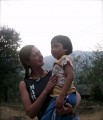Communes boomed in the seventies when the hippie generation denunciated modern culture and formed their own tight-knit living communities. Communes can be defined as living communities composed of individuals who have chosen to retract from societal norms, whom share similar values, and all contribute in completion of daily tasks. In the 1970’s communes were portrayed as dubious by the media and are still depicted similarly in modern times. Recent thriller Martha Marcy May Marlene is the perfect example in which a communal living environment is projected as a dark and dangerous cult. While the bourgeois likely continues to view communes as cults with strange spiritual beliefs, drugs, and sexual promiscuity, this is a rather deviating image from what most modern communes are like in actuality.
While my first vision of communes was devised by a few extraneous Europeans wandering through the countryside of Brazil, I have since learned that many of today’s communes are actually intricately and intelligently designed. The most popular modern communes seem to be attempts at self-sufficiency and sustainability. Far removed from cities, a number of small farms have developed completely organic strategies and allow like-minded individuals to come and share in work and benefits, living off the land. Many of the organic farms grow produce to feed their small community, while enacting very little harm on the environment. Similar to communes of the seventies, modern communes seem to be entrenched in ecological values. It seems that most of today’s communes still value sharing and community, but are also eco-communities.
World Wide Opportunities on Organic Farms (WWOOF) is an international organization that links volunteers with organic farms, and has hosts on nearly every continent. WWOOFing has become quite popular in the travel world, as it provides individuals the opportunity to travel cheaply, feel accomplished while on the road, and get in touch with locals in a foreign environment. The organization’s motto is “living, learning, sharing organic lifestyles,†all values which perfectly synchronize with those of communal living. The organization connects those who want to get away, enjoy thinking outside the box, want work in harmony with the land, and share with others.
While I am personally new to WWOOFing and have only participated as a volunteer once, I have many good things to say about my experience. I joined WWOOF Canada eight months ago and began the hunt. I spent a few months reading about hosts and investigating my options. I chose the islands of British Columbia as my desired location to experiment, and sorted through my many organic options until I found a few that matched my interests exactly. I selected a small off-the-grid farm and planned to spend a month living there, envisioning my experience disconnected from technology, and rather connected to the land.
I was completely impressed and full of excitement upon arrival, realizing that this was going to be a very unique experience in my life. Daily routines hardly seemed to be focused upon stressful work. Rather the day revolved around hearty meals, and of course sunshine. Being late in the fall season, the sun set quite early, and was diminishing earlier and earlier by day. While we were certainly living completely communally on Halcyon Horizon, I still have a hard time labeling the locale as a commune, mostly because of the questionable images the term conjures. Still, the mini community based on communal sharing was so warm and relaxing that I’m quite sure I’ve never felt so at ease in my entire life. During my experience on Vancouver Island I had the most vivid, prophetic dreams than I have ever encountered during the night before.
Halcyon Horizon is located about twenty minutes from the closest town, Bamfield, which has about 150 year-round residents. When the wonderful couple who owns the land shops for food, they do so in preparation for months without access to stores. Of course being an organic farm, a large proportion of what we ate was harvested from the garden directly. The garden was energized by a state-of-the-art humanure compost system, built from our own human excrements after two years of breakdown time, mixed with other organic materials.
The compost system was not the only innovative strategy used on Halcyon Horizon. All electricity on the property, being completely off-the-grid, was generated locally by solar panels and a micro-hydro dam. The four of us drank rainwater that first ran through a selective filter, washed dishes with sparing boiled water, and showered modestly only when the sun provided enough warmth to heat the shower tap. This may all seem a bit out there, but as a scientist myself I can assure that all habits and constructions were carefully planned and rooted in science. As a result I was able to reduce my carbon fingerprint to nearly nothing for about a month. It was wonderful.
The idea of sharing, the other WWOOFer and I working rather for money but a happy element to live in, was forever imminent and a very important part of our communal lifestyle. We shared tasks, food, and our cultural differences. Halcyon Horizon is certainly removed from modern society, both physically and electrically, and as a result we all developed respect for each other and the land surrounding us. While it sounds perfect, and it nearly was, one frustration arose relatively frequently. While living far removed from society’s problems and combating them on just a microscopic basis, the world of consumption loomed not far from our seclusion. While we were exploiting very little water and emitting miniscule portions of carbon into the atmosphere, out there everyone else in the world was living normally. While residing on the commune did give me senses of accomplishment and calamity, I have still returned to the real world.
Communes may be a mechanism of retracting oneself and pursuing one’s values in a group with others, but it certainly doesn’t solve the problems of the world in which we desire change.
It’s easy to forget that just because we can’t see or feel change does not mean our actions aren’t making any sort of impact. We must remember that Individual actions lead to micro- changes, which lead to macro-changes, which lead to enormous ones. After all, our actions are the only thing we can control completely.
So now I ask about our modern day communes, how different are they really from those of the seventies? Do most people escape to a commune for just a short period, after which they trickle back in to modern society and go back to their previous lives? And most importantly, can living in seclusion and making a small impact possibly be worse than contributing to the mega-consumerist ways of modern society?
It seems that many of us will never be satisfied, rather dream about living in a peaceful, secluded communal environment where sharing with one another and appreciating the land is of greatest importance. If this sounds rather gratifying to you, WWOOF may be up your alley. The organization will connect you with a wonderful collective environment, countless interesting individuals, and may even take you around the globe asking questions without definitive answers.

